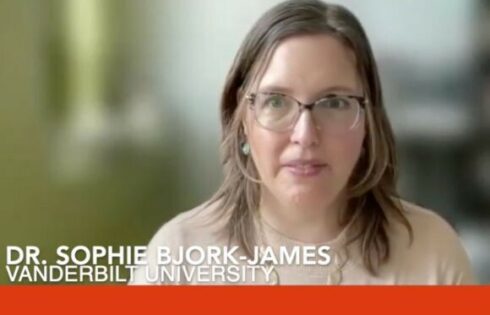
A renowned University of California-Riverside professor recently advised students to save Mother Earth, eat vegetarian, only have 1.5 kids – two at the most – take up social justice causes, and “lower your standard of living.”
Biology Professor Richard Cardullo – recently tapped by several federal agencies to assist with redeveloping how college students across the nation study life science – offered the advice to a room full of middle school students as part of the university’s online science lecture series, recorded on the campus earlier this year. A video of his talk is posted on YouTube.
He began his 50-minute lecture, “Is Earth Overpopulated,” by painting a picture that the planet doesn’t have the room or resources for more and more humans, yet that’s the direction in which it’s headed.
“What is the carrying capacity of the planet?” Cardullo said. “As the population goes up we are using more and more resources at a faster rate. … Most people think (Earth’s carrying capacity is) in the range of nine to 13 billion. And remember – no matter what we do – we believe we are going to be at nine billion by 2030 anyway.”
Apparently famine, disease and war do not have the ability to effectively roll back the burgeoning human population and save the planet’s resources, the professor noted.
“If you want to minimize environmental impact, perhaps you should consider lowering your standard of living, for instance,” Cardullo told the students.
But that won’t cut it entirely, he said.
“Ultimately … the argument is, we have got to do something about population as well. The United States, we are very affluent. … We currently have a population of 313 million people. … Altogether we gain one person every 15 seconds. … If we want to take the population down to 150 million, all it would require in the next 100 years is to lower that birth rate – because we are not going to do it through any other method, right? That would be horrible.”
Cardullo ultimately advocates family planning for the task.
“That means your generation and the next generation, if they are committed to doing this, would mean having family sizes that on the average are 1-and-a-half children, or two,” he said. “Some would have one, some would have two. It would be 50/50.”
Cardullo’s lecture then morphed into somewhat of a sexual education seminar, explaining to the students on a cellular level how sperm fertilizes an egg, and how scientists study new ways to stop that from happening.
“Sperm is a vector … which leads to increased populations, so many scientists want to know, ‘Are there new ways we can control population or fertility rates?’ … so individuals can make the decisions to keep those rates low,” he said. “We are talking about controlling human fertility.”
He cited Gossypol, a cotton derivative that can cause sterility in males, as something under scrutiny by the scientific research community. Apparently in large doses it has the unfortunate effect of killing people, however.
“That’s one form of birth control, but probably not a good one,” Cardullo said, then chuckled. “So ultimately the World Health Organization argued against using it. But interestingly enough, there are countries in the world (such as China now investigating) using it as a permanent method for controlling fertility in males, which is an option.”
Cardullo turned to some advice from renown conservationist and Professor Joel Cohen, who oversees the Laboratory of Populations at Rockefeller and Columbia Universities, to conclude his speech to the kids.
“So what are we going to do? What are you going to do is the real question, because my generation is about done, we’ve left this for you,” Cardullo said. “We have talked about fertility control, we have talked about the environment, we clearly have to start making some smart choices, there are a few solutions.”
For one, continue to use technology and innovation to increase production of resources, he said. But there are some other ideas as well, he said, citing Cohen’s work.
“ ‘Put fewer forks on the table,’ meaning reduce the numbers and expectations of people through such means as family planning,” Cardullo said.
He also suggested not eating meat.
“One of the things we know is the production of meat is incredibly expensive,” he said. “You are going to start hearing more and more about humans’ carbon footprint, and one of the biggest contributions to that carbon footprint is the production of meat. … We could do a lot simply by just becoming more vegetarian.”
Finally, change attitudes, he said.
“We could teach better manners … enhance social justice,” he said. “What are we going to do about continents like Africa. Is it fair to say we are going to be affluent, but other parts of the world are not? These are all decisions you are going to be making.”
IMAGE: Bluedharma/Flickr
Click here to Like The College Fix on Facebook.






Please join the conversation about our stories on Facebook, Twitter, Instagram, Reddit, MeWe, Rumble, Gab, Minds and Gettr.